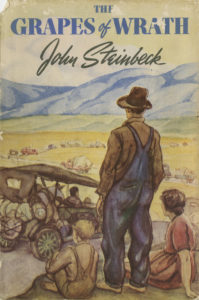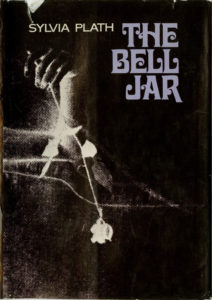
The Grapes of Wrath Book Cover
Welcome back, class.
The Grapes of Wrath is not a popular book. Very few people I know like it—it’s just too weird. The story is interrupted by short, confusing chapters that have nothing to do with the main characters. Steinbeck’s writing style has this odd repetition to it, which easily annoys anyone already confused. The ending is anticlimactic, detached, morbid, and vague. I have no solution for these issues, because they are issues of taste. If you have to read it, get over it.
If you can do that, what you’ll find is a powerful, moving portrayal of the Great Depression and the Dust Bowl. In my opinion, that’s the reason it made the list.
While I hated The Grapes of Wrath in high school (it lost me as early as the third chapter), the reread showed me two reasons to appreciate it—its connections to The Odyssey, and its carefully created characters.
Apparently, remaking The Odyssey is a common practice in literature. The journey home, the monsters and obstacles on the way, the gods dooming the quest…there are so many ways to adapt the fundamental story, and Steinbeck holds very little back adapting it here. Our hero is Tom Joad, skilled in all ways of contending, recently released from prison. He and his family load up the truck and head west, in search of a new home.

Henry Fonda as Tom Joad in The Grapes of Wrath (1940)
The adaptations of each Odyssean episode are fun to pick out (fun being a relative term). The immature man selling parts, mumbling about his dire situation and his missing eye, is the Cyclops trying to trap the Joad family in his childish pessimism. Another character, complaining about what the country’s coming to, is one of the sirens—Tom says he’s just “singing a kind of song,” and doing nothing about it. Their new home, California, is ripe with dangers like cops trying to push them out and other wanderers taking what scarce employment remains, just like the suitors Odysseus faces when he finally makes it home to Ithaca.
But Steinbeck doesn’t just recycle The Odyssey. The Grapes of Wrath is also an anti-Odyssey, which makes it just as interesting to find connections. Poseidon, god of the sea, tried to destroy Odysseus, but the Joad family faces the Dust Bowl—there is no sea, no water, no replenishment for the Joads. The search for home is just as twisted—the Joads had a home, and they were kicked out. They spend the last half of the novel looking for work, not home. Odysseus’ reunion with his family is mocked here, as the Joad family slowly falls apart from the strain of the quest. The ambiguous ending either supports the Joad’s strength to carry on, or shows a family blown apart by the hardships of 1930s America. This is not the same journey Odysseus faced.

John Steinbeck
The story works without noticing the Odyssey connections as well (it’s less fun, but it works), all because of Steinbeck’s realism with the characters. Tom’s grandparents bicker and fumble around like any loving couple would, but are never stereotypes. The children, Ruthie and Winfield, see the world as only children would—they reveal family secrets out of pride for knowing them, make fun of their uncle’s alcoholism by pretending to be drunk, and can’t understand death except as the absence of a person they loved.
Without a doubt, the core relationship in the novel is between Tom and his mother. She is the matriarch keeping the family together, and he is her strength. She’s always loved how he copes with the world, and he is beyond her understanding, but he always comes back. Tom loves her like any son would, and as much as the world pulls him away, she anchors him to what matters. Their final scene finally breaks the family’s quest, and whether or not the Joad family has truly found home is up to the reader to decide.
The Grapes of Wrath is hard to read, and I don’t recommend it for high school students—it’s too confusing, even for adults. But if you have help, reading this book can reveal 1930s American life with stark clarity. It’s messages make sense today, as we face the same sociopolitical problems—homelessness, class discrimination, police brutality, racism, and the flaws of capitalism. It’s a novel worth studying.
In the spirit of the holidays, I’ll get scrooged and read A Christmas Carol by Charles Dickens next. Have a good week!
Prof. Jeffrey
 The story follows Esther Greenwood, a young woman with a bright future who begins to suffer from depression. At first it’s mild—inconvenient distresses that affect her life here and there—but it develops into suicidal thoughts and actions. One almost-forgettable moment stands out to me: she sleeps in one morning, innocently enough, because she feels like there’s nothing to look forward to if she gets up. The light from the window shines in, but she buries herself in her sheets and under her pillow, back into the darkness. It’s subtle, but it’s a clear sign of her illness affecting her every moment.
The story follows Esther Greenwood, a young woman with a bright future who begins to suffer from depression. At first it’s mild—inconvenient distresses that affect her life here and there—but it develops into suicidal thoughts and actions. One almost-forgettable moment stands out to me: she sleeps in one morning, innocently enough, because she feels like there’s nothing to look forward to if she gets up. The light from the window shines in, but she buries herself in her sheets and under her pillow, back into the darkness. It’s subtle, but it’s a clear sign of her illness affecting her every moment.



Recent Comments